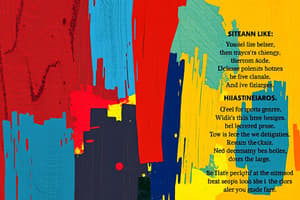Podcast
Questions and Answers
What is the primary function of literature as defined in the content?
What is the primary function of literature as defined in the content?
- To store historical data and scientific knowledge
- To serve as a factual account of events
- To creatively use language to express human realities (correct)
- To convey complex intellectual theories
Which of the following statements about the universality of literature is correct?
Which of the following statements about the universality of literature is correct?
- Good literature transcends nationality and cultural boundaries. (correct)
- Literature is exclusively for the educated elite.
- Literature primarily reflects the intellectual achievements of a race.
- Good literature is limited by national boundaries.
How is prose fiction distinguished from poetry according to the content?
How is prose fiction distinguished from poetry according to the content?
- Prose fiction is written in meter and rhyme.
- Prose fiction is based entirely on historical events.
- Prose fiction only includes fictional accounts of real people.
- Prose fiction does not adhere to verse form or stanza. (correct)
Which genre is specifically characterized as being primarily based on imaginary characters and events?
Which genre is specifically characterized as being primarily based on imaginary characters and events?
What is the characteristic of a short story as explained in the content?
What is the characteristic of a short story as explained in the content?
What is a defining characteristic of a novella compared to a short story and a novel?
What is a defining characteristic of a novella compared to a short story and a novel?
Which of the following is NOT a characteristic of novels?
Which of the following is NOT a characteristic of novels?
In which type of literature would you most likely find an account of events written in the first person?
In which type of literature would you most likely find an account of events written in the first person?
What distinguishes informational articles from essays?
What distinguishes informational articles from essays?
Which statement about biographies is true?
Which statement about biographies is true?
Flashcards are hidden until you start studying
Study Notes
What is Literature?
- Literature encompasses the written records of a culture, including history, sciences, poems, and novels.
- Literature is the artistic representation of life.
- Literature utilizes language creatively to convey messages to its audience and express human realities.
Qualities of Literature
- Literature appeals to emotions and imagination rather than intellect.
- Literature is considered permanent and universal.
- Literature transcends nationality and boundaries, focusing on fundamental human emotions and passions.
Types of Literature
- Oral Literature: Transmitted through spoken word.
- Written Literature: Presented in written form.
What is Genre in Literature?
- Genre categorizes literary works based on shared features of form and content.
The Four Major Categories of Genre
- Fiction
- Non-fiction
- Poetry
- Drama
Fiction
- Deals with non-factual materials or events.
- Characters, settings, and events are imagined by the author.
- Can be inspired by real events or entirely fictional.
Genres of Fiction Literature
- Prose Fiction: Writing that is not poetry or verse.
- Short Story: A brief work of fiction generally read in one sitting, focusing on one or two characters facing a single problem or conflict.
- Novella: Longer than a short story but shorter than a novel, with less character development than novels.
- Novel: A longer and more complex fictional work with fully developed setting, plot, characters, and theme.
Non-Fiction
- Deals with factual materials or events.
- Features real people.
- Written to be read like fiction.
- Genres of Non-fiction Literature:
- Autobiography: An account of someone's life written by themselves.
- Biography: An account of someone's life written by someone else.
- Essays: Short pieces of writing exploring a single subject from the author's perspective.
- Informational Articles: Present factual information on a specific subject.
Studying That Suits You
Use AI to generate personalized quizzes and flashcards to suit your learning preferences.




